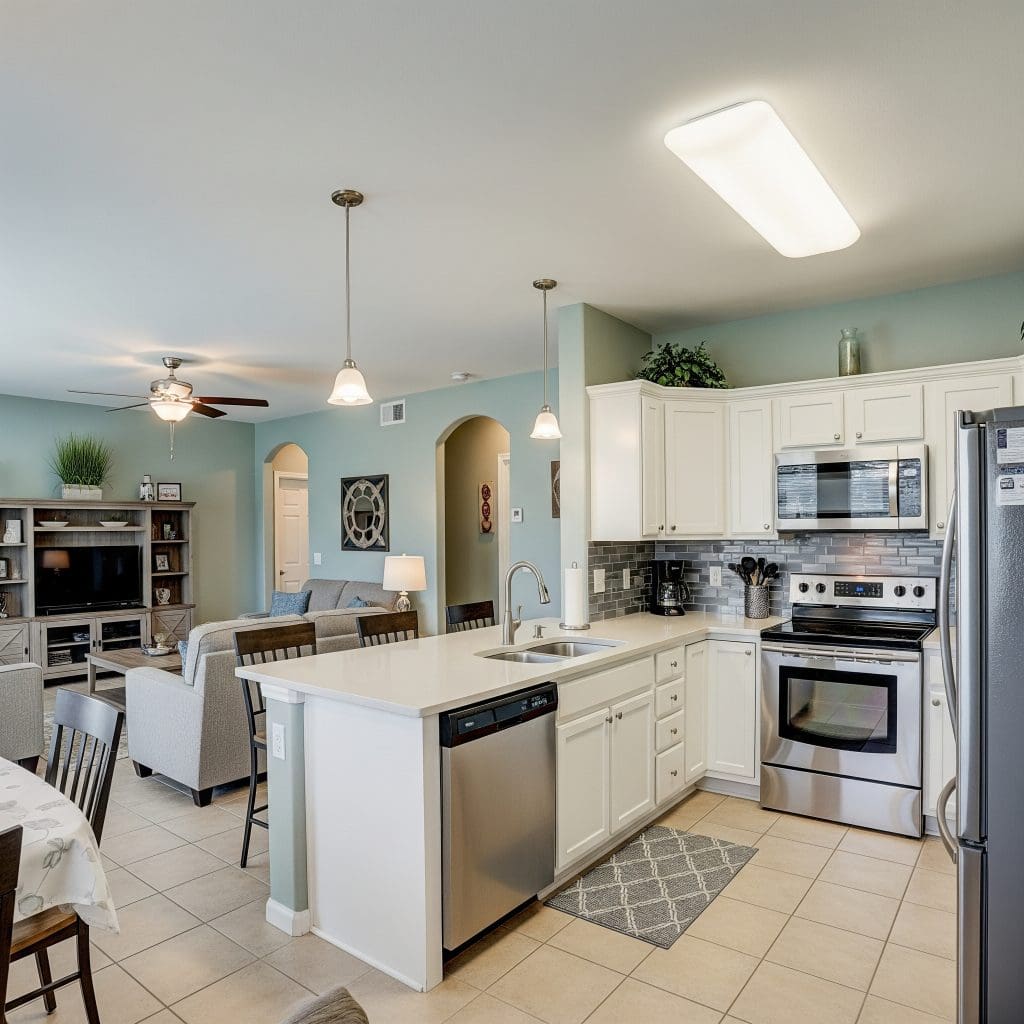Maximize Your Profits: Unlocking Tax Deductions and Loopholes for Airbnb Rental Property Owners in Austin
AUSTIN, TX – JUNE 27, 2025: Austin, Texas – a vibrant hub of culture, technology, and live music – has long been a magnet for real estate investors. Its booming tourism, major events like SXSW and Austin City Limits, and the influx of tech giants like Apple and Tesla’s Gigafactory, make it an incredibly attractive market for short-term rental (STR) properties, commonly operated through platforms like Airbnb.
IN THIS ARTICLE:
- The Tax Landscape for Austin Airbnb Owners: Beyond the Basics
- Strategic "Loopholes" and Advanced Tax Planning
- Fueling Your Austin Airbnb Ambitions: Smart Financing with GHC Funding
- GHC Funding: Your Strategic Partner in Austin Real Estate
- The Power of Property-Centric Lending for Airbnb
- Frequently Asked Questions (FAQs) for Austin Airbnb Investors
- Q1: What are the biggest tax deductions for an Airbnb property in Austin?
- Q2: How does a DSCR loan benefit me specifically as an Austin Airbnb owner regarding taxes?
- Q3: Are there specific Austin regulations that impact tax deductions for STRs?
- Q4: Can I deduct the costs of furnishing my Airbnb property in Austin?
- Q5: What credit score is typically needed for a DSCR loan for an Austin Airbnb?
- Q6: Can I still claim depreciation if my Austin Airbnb property is rarely rented out?
- Q7: How does GHC Funding's expertise in the Texas market help me with my Austin Airbnb investments?
- Essential Resources for Texas Real Estate Investors
- Optimize Your Austin Airbnb Profits Today!
- Tax deductions and loopholes for Airbnb rental property owners – GET A DSCR LOAN QUOTE NOW
However, success in the Austin Airbnb market isn’t just about high occupancy rates and positive guest reviews. It’s also about strategic financial management, and a significant part of that involves understanding tax deductions and loopholes for Airbnb rental property owners in Austin. By meticulously tracking expenses and leveraging available tax strategies, you can significantly enhance your property’s profitability and long-term financial health.
This comprehensive guide will walk you through the essential tax benefits available to Austin Airbnb owners, and how smart financing can play a crucial role in maximizing these advantages.
Need capital? GHC Funding offers flexible funding solutions to support your business growth or real estate projects. Discover fast, reliable financing options today!
⚡ Key Flexible Funding Options:
GHC Funding everages financing types that prioritize asset value and cash flow over lengthy financial history checks:
DSCR Rental Loan
- No tax returns required
- Qualify using rental income (DSCR-based)
- Fast closings ~3–4 weeks
SBA 7(a) Loan
- Lower down payments vs banks
- Long amortization improves cash flow
- Good if your business occupies 51%+
Bridge Loan
- Close quickly — move on opportunities
- Flexible underwriting
- Great for value-add or transitional assets
SBA 504 Loan
- Low fixed rates through CDC portion
- Great for construction, expansion, fixed assets
- Often lower down payment than bank loans
🌐 Learn More
For details on GHC Funding's specific products and to start an application, please visit our homepage:


The Tax Landscape for Austin Airbnb Owners: Beyond the Basics
Owning an Airbnb in Austin (whether it’s a cozy bungalow in Zilker, a chic condo downtown, or a spacious home in Mueller) means you’re operating a business. And like any business, you’re entitled to deduct legitimate expenses to reduce your taxable income. The City of Austin also has specific short-term rental regulations, including licensing requirements (e.g., Type 1, 2, or 3 licenses, depending on owner-occupancy), which you must comply with to operate legally.
Essential Tax Deductions Every Austin Airbnb Owner Should Claim:
- Mortgage Interest: This is often the largest deduction for many property owners. The interest paid on your DSCR Loan or other real estate financing for your Airbnb property is fully deductible. This significantly reduces your taxable income, making smart financing choices even more impactful.
- Property Taxes: As a Texas property owner, you pay property taxes to the local county (Travis County for most of Austin) and various taxing entities. These are fully deductible.
- Depreciation: This is arguably the most powerful “loophole” for real estate investors. The IRS allows you to deduct a portion of your property’s value (excluding land) each year as it “wears out.” For residential properties, this is typically spread over 27.5 years. This non-cash deduction can create substantial paper losses that offset your rental income, even if your property is cash-flowing positively.
- Utilities: Electricity, water, gas, internet, and trash services directly related to your Airbnb operations are deductible.
- Cleaning and Maintenance: Costs for professional cleaning services between guests, repairs (e.g., fixing a leaky faucet, patching drywall), and routine maintenance (e.g., yard work for a home in South Congress) are fully deductible.
- Supplies: Consumables provided for guests, such as toiletries, linens, coffee, and welcome basket items, are deductible business expenses.
- Insurance Premiums: Homeowner’s insurance, landlord insurance, and any specific short-term rental insurance policies are deductible.
- Management Fees: If you use a property manager to handle bookings, guest communication, and maintenance (common in areas like East Austin for busy investors), their fees are deductible.
- Advertising and Marketing: Costs associated with listing your property on Airbnb, Vrbo, or other platforms, as well as professional photography, are deductible.
- Travel Expenses: If you travel to Austin from another city to manage your Airbnb, certain travel costs can be deductible.
- Professional Fees: Payments to accountants, lawyers, real estate agents, and other professionals for services related to your Airbnb business are deductible.
- Home Office Deduction: If you use a dedicated space in your primary residence exclusively for managing your Airbnb business, you may be eligible for a home office deduction.
Strategic “Loopholes” and Advanced Tax Planning
Beyond standard deductions, experienced real estate investors employ advanced strategies to further optimize their tax burden:
- Cost Segregation Study: This powerful strategy involves an engineering-based study that reclassifies components of your property (e.g., carpeting, appliances, landscaping) from 27.5-year depreciation to shorter recovery periods (5, 7, or 15 years). This significantly accelerates depreciation deductions, generating larger tax write-offs in the early years of ownership. For a high-value Airbnb in a prime Austin location like Downtown Austin (78701) or Zilker (78704), a cost segregation study can unlock substantial immediate tax savings.
- Real Estate Professional Status (REPS): For highly active investors, qualifying as a Real Estate Professional can be a game-changer. This status allows you to bypass the passive activity loss (PAL) rules, enabling you to deduct unlimited real estate losses (including those generated by depreciation) against your active income (e.g., W-2 wages, business profits). This is a complex qualification requiring significant time spent in real estate activities and material participation in your rental properties, but for serious investors, it’s a major “loophole.”
- 1031 Exchange: This allows real estate investors to defer capital gains taxes when selling an investment property by reinvesting the proceeds into a “like-kind” property. This is an incredible tool for wealth building, enabling you to continuously grow your portfolio without immediate tax implications. If you’re selling a profitable Airbnb in a desirable Austin neighborhood like Travis Heights (78704) and want to acquire a larger multi-unit property in North Loop (78751) or an emerging market like Round Rock (78664) or San Marcos (78666), a 1031 exchange can be instrumental.
- Material Participation: Even without full REPS status, actively managing your Airbnb can help you meet material participation tests, potentially allowing you to deduct passive losses against other passive income.
Always consult with a qualified tax professional specializing in real estate to ensure you’re compliant with IRS regulations and maximizing your specific tax advantages.
DSCR Loan IQ Quiz!

Test your knowledge of Debt Service Coverage Ratio (DSCR) loans!
Fueling Your Austin Airbnb Ambitions: Smart Financing with GHC Funding
Understanding tax benefits is crucial, but so is securing the right financing to acquire and manage your Airbnb properties efficiently. The stronger your financial foundation, the better positioned you are to capitalize on tax advantages and maximize your returns.
At GHC Funding, we are uniquely positioned to help Austin Airbnb investors with flexible and efficient financing, especially through our specialized DSCR Loans.
DSCR Loans: The Investor’s Choice for Airbnb Properties
DSCR (Debt Service Coverage Ratio) loans are specifically designed for investment properties, focusing on the property’s income-generating potential rather than your personal income or tax returns. This makes them an ideal fit for Airbnb properties, where income can fluctuate.
Current Market Insights (as of June 27, 2025):
- Interest Rates: DSCR loan rates are competitive but can vary based on factors like the property’s LTV, your credit score, and the actual DSCR. As of today, you can expect rates to generally range from 7.00% to 10.50%. Higher credit scores (e.g., 700+), lower LTVs (e.g., 65-70%), and strong DSCRs (e.g., 1.25x or higher) typically secure the best rates.
- Loan-to-Value (LTV): Generally up to 80% LTV, meaning a down payment of 20-25% is typical.
- Debt Service Coverage Ratio (DSCR): Lenders typically require a DSCR of 1.10x to 1.25x or higher, meaning the property’s gross rental income (annualized from Airbnb projections, often using a rental analysis report) must comfortably cover its mortgage payments (principal, interest, taxes, insurance, HOA).
- Requirements Emphasizing Investor Benefits:
- No Personal Income Check: This is the most significant advantage. Lenders do not require W-2s, pay stubs, or personal tax returns. This simplifies the application process immensely and is perfect for investors with complex income streams or those looking to expand rapidly without affecting their personal debt-to-income ratio.
- Entity Requirements: Loans are typically made to LLCs or other business entities, providing crucial personal liability protection for your investment.
- Property Types Accepted: DSCR loans are perfect for residential investment properties, including single-family homes, 2-4 unit multi-family properties, and condos – all prevalent types in the Austin Airbnb market.
- Credit Score: A minimum credit score, typically 620-680+, is usually required. Higher scores lead to better terms.
Beyond DSCR loans, GHC Funding also offers flexible Bridge Loans for rapid acquisitions or rehabilitation projects, SBA 7(a) loans and SBA 504 Loans if your Airbnb business has a primary owner-occupied component, and other Alternative Real Estate Financing options for unique investment scenarios.
The Ultimate Quiz on Going Passive in Real Estate

Are you ready to transition from an active landlord to a savvy, passive real estate investor? True success in "Going Passive in Real Estate" isn't just about buying property; it's about smart strategies and leveraging the right tools to build wealth without the daily grind. This quiz is designed to test your knowledge on the key concepts that separate the hands-on hustlers from the hands-off investors. See how well you understand the fundamentals of building a truly passive income stream through real estate
GHC Funding: Your Strategic Partner in Austin Real Estate
Why choose GHC Funding for your Austin Airbnb investments?
- Flexible Underwriting: We understand the unique cash flow dynamics of short-term rentals, allowing for more agile and adaptable lending solutions. Our focus is on the asset’s performance.
- Market Expertise: We possess deep knowledge of the Texas real estate market, from Austin’s booming neighborhoods like Barton Hills (78704), Hyde Park (78751), and Tarrytown (78703), to major economic hubs like Houston (The Heights, Montrose) and Dallas (Uptown, Deep Ellum). We recognize the economic engines – tech industry growth, major universities, and cultural tourism – that fuel these markets.
- Streamlined Process: Our efficient approval and funding process means you can secure financing quickly, allowing you to seize opportunities in Austin’s competitive market before they’re gone.
- Investor-Centric Approach: We speak your language. Our team is dedicated to understanding your investment goals and providing financing that aligns with your strategy, including maximizing your tax advantages.
Imagine purchasing a charming bungalow in Cherrywood (Austin, 78722) for an Airbnb, knowing that GHC Funding’s DSCR loan will simplify your financing, and then leveraging depreciation and a potential cost segregation study to significantly reduce your taxable income. This holistic approach is what sets successful investors apart.
The Power of Property-Centric Lending for Airbnb
The distinct advantage of DSCR loans, particularly from a specialized lender like GHC Funding, for Airbnb property owners is the property-centric underwriting. Unlike traditional mortgages that scrutinize your personal income and debt, DSCR loans primarily assess the rental income potential of the property itself.
This means:
- No Personal Income Stress: Your personal tax returns or W-2s are generally not required, simplifying the application process significantly. This is a huge relief for self-employed investors or those with fluctuating income.
- Scalability: Easier to qualify for multiple investment properties, as your personal DTI isn’t a limiting factor.
- Focus on Asset Performance: The loan’s approval hinges on the property’s ability to generate income, directly aligning with your Airbnb business model.
This contrasts sharply with traditional banks that may view fluctuating Airbnb income as a risk, making it harder to qualify, or requiring extensive documentation that delays your investment plans.
Frequently Asked Questions (FAQs) for Austin Airbnb Investors
Q1: What are the biggest tax deductions for an Airbnb property in Austin?
A1: The most significant deductions typically include mortgage interest, property taxes, cleaning and maintenance costs, utilities, and most importantly, depreciation. A cost segregation study can significantly accelerate depreciation.
Q2: How does a DSCR loan benefit me specifically as an Austin Airbnb owner regarding taxes?
A2: A DSCR loan allows you to acquire your income-generating Airbnb property without tying up your personal income. The interest paid on this loan is a fully deductible business expense, directly reducing your taxable rental income. By focusing on the property’s cash flow, DSCR loans make it easier to expand your portfolio, leading to more properties eligible for tax deductions like depreciation.
Q3: Are there specific Austin regulations that impact tax deductions for STRs?
A3: While local regulations (like those from AustinTexas.gov regarding STR licenses) don’t directly create tax deductions, compliance is crucial. Operating a legal STR ensures your business is legitimate, allowing you to confidently claim all applicable deductions. Non-compliance could jeopardize your ability to deduct expenses.
Q4: Can I deduct the costs of furnishing my Airbnb property in Austin?
A4: Yes, the costs of furniture, appliances, and decor for your Airbnb are generally depreciated over a shorter period (e.g., 5-7 years) than the property itself, providing additional deductions.
Q5: What credit score is typically needed for a DSCR loan for an Austin Airbnb?
A5: While requirements vary by lender, GHC Funding typically seeks a minimum credit score in the 620-680+ range. A higher score can lead to better loan terms and interest rates.
Q6: Can I still claim depreciation if my Austin Airbnb property is rarely rented out?
A6: To claim rental property deductions, including depreciation, you must demonstrate “profit motive” and generally engage in rental activity for at least 14 days during the year. If rental activity is minimal, it might be classified as a personal residence, limiting deductions.
Q7: How does GHC Funding’s expertise in the Texas market help me with my Austin Airbnb investments?
A7: Our team deeply understands the unique characteristics of the Austin market, including its strong tourism seasons, tech industry influence, and specific neighborhood dynamics (e.g., demand for luxury rentals in Westlake Hills (78746) vs. more affordable options near UT Austin (78705)). This allows us to provide tailored financing solutions and knowledgeable support that aligns with your local investment strategy and optimizes your property’s potential.
Test Your Expertise: The Complexities of the 1031 Exchange

As a sophisticated real estate investor, you understand that the 1031 Exchange is a cornerstone strategy for tax deferral and wealth accumulation. But beyond the basics, the intricacies of the 1031 Exchange rules can pose significant challenges. This quiz is designed to test your in-depth knowledge and highlight critical nuances that separate casual investors from true experts in 1031 Exchange transactions.
Instructions: Choose the best answer for each question.
Essential Resources for Texas Real Estate Investors
To further assist you in navigating the Texas real estate and tax landscape, consider these valuable external resources:
- Texas Real Estate Commission (TREC): https://www.trec.texas.gov/ – The official state agency that regulates real estate brokers and sales agents in Texas. Essential for understanding licensing and general real estate law.
- AustinTexas.gov – Short-Term Rentals: https://www.austintexas.gov/department/short-term-rentals – Official information on Austin’s specific regulations and licensing requirements for short-term rental properties.
- Real Estate Investment Club of Austin (REICAUSTIN): https://www.reicaustin.org/ – A local organization offering networking, education, and insights for real estate investors in the Austin area. (Alternatively, check their Meetup groups as listed in search results if the website is not purely an association site: e.g., Austin Real Estate Networking Club).
- Texas Department of Housing and Community Affairs (TDHCA): https://www.tdhca.state.tx.us/ – While focused on affordable housing, this agency provides broader housing market data and trends that can inform investment decisions across Texas.
- Travis Central Appraisal District (TCAD): https://www.traviscad.org/ – For property tax records, valuations, and protest information for your Austin property.
Optimize Your Austin Airbnb Profits Today!
Mastering tax deductions and loopholes for Airbnb rental property owners in Austin is a cornerstone of successful real estate investment. Coupled with strategic financing, you can significantly boost your cash flow and long-term wealth.
Don’t leave money on the table or miss out on lucrative investment opportunities due to a lack of flexible financing. GHC Funding is ready to be your trusted partner, offering the specialized DSCR Loans and other solutions you need to thrive in Austin’s dynamic market.
Ready to maximize your Airbnb profits and expand your portfolio?
Visit www.ghcfunding.com today to explore our tailored financing options, or contact our expert team directly for a personalized consultation. Let’s build your Austin real estate legacy together!
Tax deductions and loopholes for Airbnb rental property owners – GET A DSCR LOAN QUOTE NOW
Get a No Obligation Quote Today.
Use these trusted resources to grow and manage your small business—then connect with GHC Funding
to explore financing options tailored to your needs.
GHC Funding helps entrepreneurs secure working capital, equipment financing, real estate loans,
and more—start your funding conversation today.
Helpful Small Business Resources

